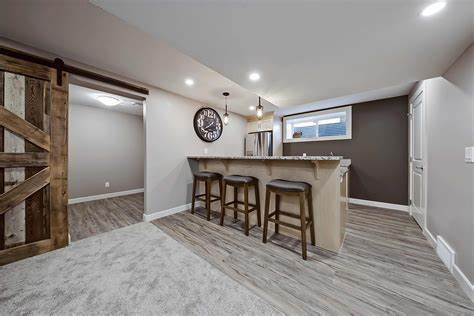Definition of Inclusive Design
Inclusive design is a methodology, centered around inclusivity, that aims to create environments and products that can be accessed, understood, and used to the greatest extent possible by all people, regardless of their age, size, ability, or disability. This is not a special requirement, for the benefit of only a minority of the population. Instead, it places people at the heart of the design process, acknowledging diversity and uniqueness, and aims to make everyone feel included by considering their varied needs and abilities in all building projects.
Maximizing Basement Accessibility through Inclusive Design
The importance of making homes, particularly basements, more accessible cannot be overstated. Basements often represent a substantial portion of a home’s total space and can serve a myriad of uses, from additional living areas to storage or recreational space. By incorporating principles of inclusive design, these areas can be made more accessible to all, expanding their functionality and overall usability. Furthermore, creating accessible basements can significantly impact those with mobility issues, enhancing their independent living and freedom within the home. It also futureproofs the house for potential changes in the family’s needs or abilities, ensuring it remains a long-term, comfortable dwelling place for everyone. Ultimately, inclusive design in basement renovation fosters a more inclusive household and society.
When considering inclusive design for your basement renovation, collaboration with professionals like The Basement Builders is crucial. As experts in basement development and renovations, The Basement Builders understand the importance of inclusivity in design and can guide you through the process of creating a space that not only meets your unique needs but also aligns with the principles of inclusive design, making it accessible and welcoming for everyone.
The Concept of Universal Design
Universal Design (UD) is a concept that broadens the principles of inclusive design. It espouses the creation of products and environments that are inherently accessible to all, including the elderly and people with disabilities. The principles of Universal Design include equitable use, flexibility in use, simple and intuitive use, perceptible information, tolerance for error, low physical effort, and size and space for approach and use.
When applied to home and basement design, these principles aim to maximize the usability of the space for everyone, regardless of their age, size, ability or disability. They advocate for barrier-free, adaptable, and accessible infrastructure. According to the Calgary Real Estate Board (CREB), incorporating Universal Design principles into home renovations or new builds can boost property value, improve the marketability of homes, and cater to an aging population’s needs. For instance, a no-step entry, wider doorways and hallways, lever-style door handles, and adjustable height countertops in basements can make the space more accessible and comfortable for all users.
Exterior Accessibility Renovations: Aging in Place
As individuals age, mobility can become a challenge, and the exterior of a home can present numerous obstacles. Hence, exterior accessibility renovations are vital to support ‘aging in place’ – the concept of living in one’s home safely, independently, and comfortably, regardless of age or ability level. Various exterior modifications can lead to a safer and more accessible environment. For instance, considering changes like installing ramp access at entrances, using non-slip materials for pathways, and incorporating good outdoor lighting can prevent potential falls and injuries. My Lifetime Home suggests that additions like handrails on both sides of stairways, easy-to-use door handles, and lower peepholes or windows in doors further enhance accessibility for older adults. By focusing on these renovations, homeowners can ensure their homes remain a comfortable, functional, and secure place to live in for many years, making ‘aging in place’ a feasible and desirable option.
Accessible Housing Calgary: An Initiative Making a Difference
Accessible Housing Calgary is a non-profit organization committed to opening doors to homes that are both affordable and accessible for people with limited mobility. By integrating inclusive design principles, they work to ensure that everyone has a home that is safe and suitable, irrespective of their physical capabilities. Their efforts go beyond making structural adjustments to buildings. They also drive awareness campaigns and advocate for policy changes that support accessible housing. This organization recognizes that an accessible home can significantly enhance quality of life, providing not just a living space but a sense of independence, comfort, and dignity. By revamping homes and changing mindsets, Accessible Housing Calgary is truly making a difference in the lives of many.
Legal Aspects and Benefits of Adding a Basement Suite in Calgary
Adding a basement suite in Calgary has legal implications which homeowners must consider. Firstly, a suite must comply with Alberta’s building codes and regulations for safety and habitability. This includes fire and building code requirements, such as adequate exit windows and ceiling heights. It’s crucial to obtain necessary permits and inspections from the City of Calgary before proceeding with construction.
The process involves a development permit application, a building permit application and, after construction, a building inspection. Legalizing a basement suite helps homeowners avoid hefty fines and ensures the suite’s safety.
Adding a legal basement suite is not just a matter of compliance; it also brings substantial benefits. A legal suite increases a property’s value and appeal to potential buyers, attracting those who might be interested in rental income potential or having a separate live-in area for family members. The added income from renting a basement suite can also offset mortgage payments and other home-related expenses. Moreover, a legal basement suite addresses Calgary’s need for more affordable housing, contributing to a more inclusive and diverse community.
Universal Design: Creating Lifelong Homes
Universal Design is more than a methodology; it’s a philosophy that embraces diversity and inclusivity, resulting in homes that are functional, safe, and comfortable for all. These homes, often termed ‘lifelong homes,’ are designed with every stage of life in mind, accommodating the needs of individuals across different age groups and physical capabilities. They offer design features like seamless, step-free entrances, wider doorways for wheelchair accessibility, adjustable countertops, and non-slip flooring. By incorporating adaptive and flexible design elements, they ensure that individuals can age in place comfortably, mitigating the need for costly and disruptive home modifications in later years. As such, Universal Design not only enhances accessibility and usability but also increases the longevity of a home, making it a smart and forward-thinking choice for homeowners and builders alike.
Conclusion
The integration of Universal Design principles in home and basement design is an essential consideration for homeowners, builders, and policy-makers. It addresses the critical need for more accessible, adaptable, and inclusive housing that caters to individuals of all ages, sizes, and abilities. Organizations like Accessible Housing Calgary lead the way in advocating for and implementing accessibility improvements in homes, setting an impactful example for communities worldwide. Legalizing a basement suite not only brings a host of benefits for homeowners but also contributes to a more diverse and inclusive housing landscape in Calgary. As our society continues to age, the concept of ‘aging in place’ becomes increasingly relevant, and universally designed, accessible homes will become the norm rather than the exception. Ultimately, Universal Design’s philosophy of inclusivity, adaptability, and longevity redefines our perception of a ‘home,’ transforming it into a lifelong sanctuary of comfort, safety, and independence.

